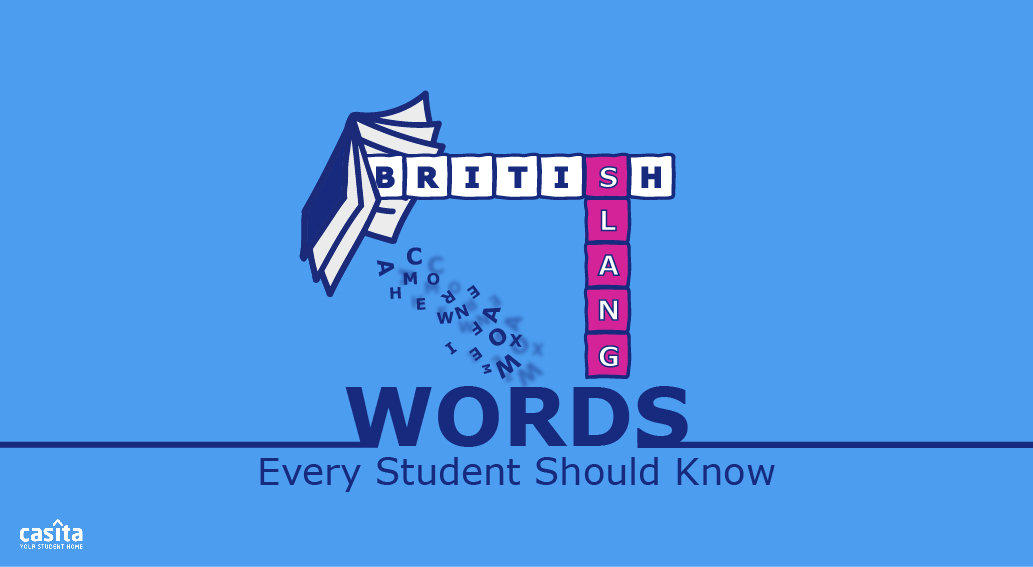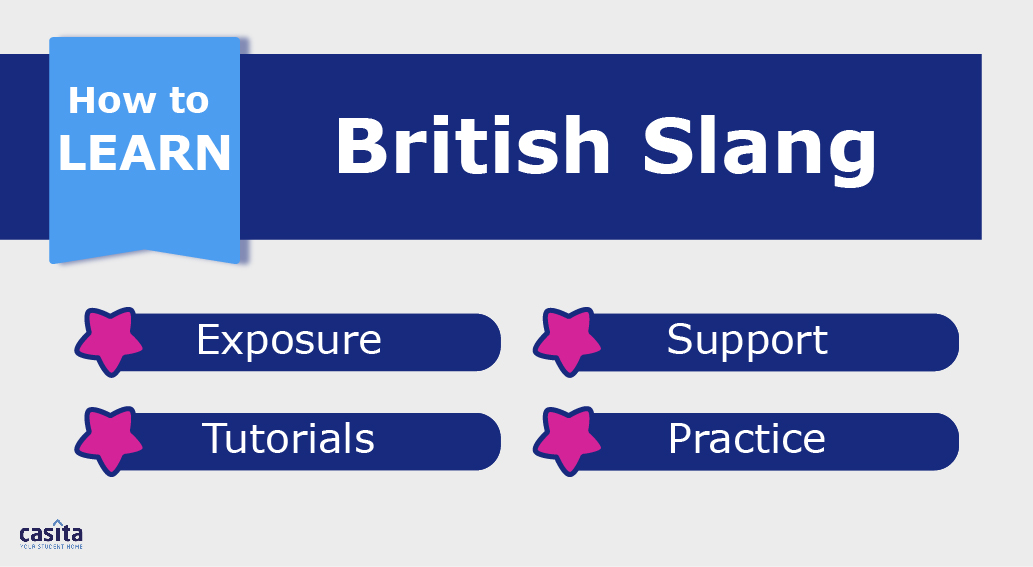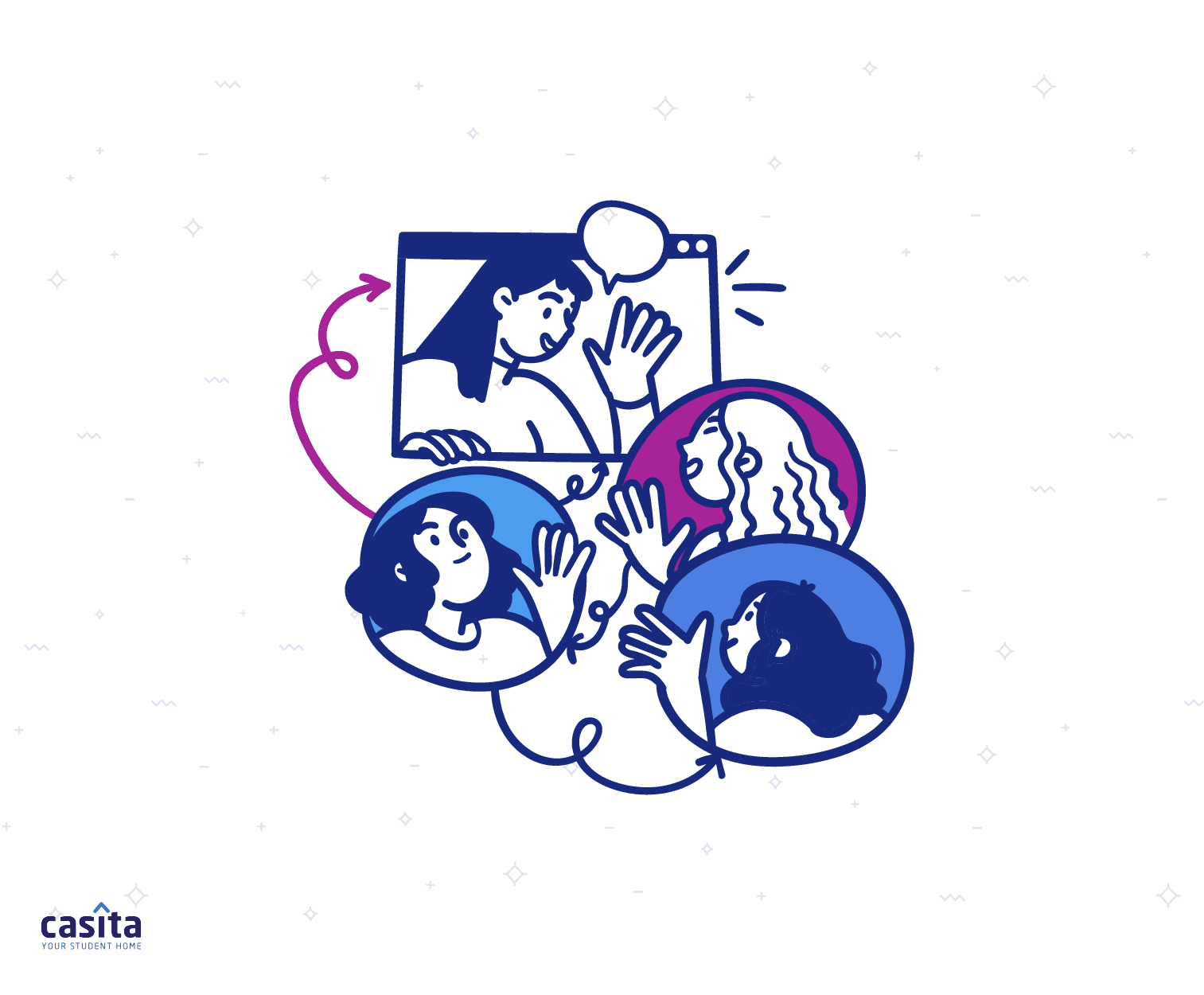British Slang Words Every Student Should Know
Tips and Advice
University Life
6 mins read
Share

Updated at: 25 November, 2025
Published at: 16 August, 2019
By Allaa Ashraf
British Slang Words Every Student Should Know
Tips and Advice
University Life
6 mins read

Updated at: 25 November, 2025
Published at: 16 August, 2019
By Allaa Ashraf
Share
British slang, a rich and colourful aspect of the English language, is vibrant and ever-evolving. Understanding it can be fun and practical for international students studying in the UK.
Depending on where you are studying in the UK, you will be exposed to different dialects of the English language. English slang words vary from one country to another and even from one dialect to another within the same country. Not only does it help you communicate more effectively, but it also helps you immerse yourself in the culture and adds a layer of authenticity to your language skills.
This article will explore a range of British slang words and phrases that every student should know, as they're used by people of all ages and backgrounds, making it a great way to fit in and make friends while studying in the UK! Buckle up, and let’s go!

How to Learn UK Slang?
As an international student in the UK, you need to familiarise yourself with some of the most common slang words used among natives and locals in the UK. UK slang is slightly different from Canadian or Australian slang. With this said, here are the top ways you can learn British slang:
1. Exposure
Seeing or hearing the language, with its unique set of slang words, is an important and effective method of learning it. You can use a variety of sources that would help you get acquainted with the language and, more importantly, the slang that you’re likely to hear on a day-to-day basis. Slang is dynamic and heavily relies on time, meaning it could change from one decade to the next. This is why you need to consume modern British media to get acquainted with recent slang, such as shows, movies, music, books, or podcasts.
Exposure is key!
2. Tutorials
We live in the digital age, where everything you want to know or learn about is within reach. If you want to learn proper UK slang, you’ll definitely find a YouTube tutorial for it, a podcast that takes you through decades of evolving British slang, or even e-books on the subject.
3. Support
Consulting a local may also be an ideal way to familiarise yourself with the lingo and slang in the UK. Once enrolled in a university or institution, you can ask fellow British students for help, make a game out of it, and learn new words every day in between classes. You’ll probably be an expert by the end of the semester!
4. Practice
After familiarising yourself with the lingo, you need to start implementing it to make sure you got everything right. A great way to do that is through quizzes! You can test your knowledge of UK slang by taking a couple of quizzes and comparing the results with friends. You can also always strike up a conversation with a group of friends and let them test you!
So, now that you’ve learned about all the possible ways to learn UK slang, it’s about time to familiarise yourself with the most popular slang words in the UK. Upcoming is our top picks!
Popular British Slang
UK Slang Words for Students
Here are some of the most common British slang words students use on a daily basis:
1. Uni
This is one of the most popular slang words among students. In British slang, "uni" is the shortened version of “university.”
2. Fresher
Another university-related cool British slang word is fresher, which means a first-year university student.
3. Libes
This is the British university slang word for a library.

4. Budge up
The next time you are sitting on a bench and a British friend comes over and asks you to budge up, you better know what it means! It means you should move over or make room for them to sit next to you.
5. Mate
Mate is a friendly way of calling someone, often used to refer to a university friend who could be either male or female. It’s the equivalent of the American English slang word "buddy." A male friend can also be called a lad or chap, and the female version of this is lass or lassie.
6. Knackered
After a long university day, being knackered simply means being tried. It's a common way to express fatigue.
7. Buzzing/Psyched
Buzzing means to be happy or excited about something, and psyched means being very excited about something.
8. Dynamite/Wicked
Dynamite is used for awesome and cool. Wicked is also used in the same context.
9. Ace
This means "excellent" or "first-rate". It is mostly used in Liverpool. In the rest of the UK, Brits use the term “Brilliant”.
10. Cheers
"Cheers" is an adaptable term in British English. It can be used to say "thank you," "goodbye," or even to raise a toast when clinking glasses. It's a friendly and polite way to express gratitude.
11. Gutted
This means you are very disappointed, devastated, or saddened.
12. Chuffed
In contrast to the previous one, when someone is chuffed, they are very pleased or happy about something.
13. Cheeky/Tongue-in-cheek
These typically mean "playful" or "ironic". It is usually used in a funny or endearing manner. “It is tongue-in-cheek” means it is sarcastic.
14. Dodgy/ Pork Pies
"Dodgy" means something is questionable, suspicious, or not quite right. Pork Pies is a synonym for lies, and the expression “Porkies” is another way of saying lies.
15. Chinwag
This one means "a chat" or "a conversation".

16. Lose The Plot/Nutter
When someone loses the plot, it means that he has become irrational and is acting ridiculously, and in other contexts, it means someone has gone crazy. A nutter is a crazy person.
17. Know Your Onions
This one basically means to be knowledgeable and an expert on something.
18. Skive off/Kip/Faffing
Skive off means to be lazy or a procrastinator. Kip is the slang word for a nap, and faffing is to waste time.
19. Jimjams
Jimjams is another term for “pyjamas.
20. Scrummy/Bangers/Nosh
If someone refers to food as scrummy, it means that it is tasty and utterly delicious. Bangers are used for sausages, and Nosh is for food.
21. Telly
"Telly" is the UK slang term for television. It's used when talking about watching TV shows or programmes.

22. Yakking/Full of Beans
Full of beans is usually used to describe an energetic person, and yakking is used to describe the action of talking too much.
23. Cap
One of the popular slang terms in British slang is to cap, which means to lie. If you suspect your friend is not telling the truth, you can simply send a baseball cap to them, and they will understand!
24. Bants
Bants is an abbreviation of banter. Banter means to joke or to exchange witty remarks with others.
25. Cuppa’
Cuppa comes from the phrase “cup of.” The implied meaning is usually a cup of tea.
26. Ledge
This is a shortening of the word “legend” and is often used to describe someone who did something incredibly cool or awesome.
27. Blimey
"Blimey" is an expression of surprise or shock. It's similar to saying "wow" or "oh my goodness."
28. Gobsmacked
This is another word to express extreme surprise, just like the previous one. If you're utterly astonished or amazed, you can say you're "gobsmacked."
29. Bob's Your Uncle
This one might be a bit weird, but in UK slang, it means "there you go" or "it's that simple." It's used to emphasise that something is straightforward or quite easy to achieve. We know, we know. What does “Bob’s your uncle” have to do with simplicity?
30. Taking the Mickey (or Mick)
When someone is "taking the Mickey," they are making fun of someone or teasing them in a light-hearted manner. It's a way of saying that they're not being serious.
31. Let
To let simply means that a place is vacant to be rented, so if you are looking for student accommodation in the UK near your university, you know which British slang words to use or expect to hear from our student accommodation experts.
Money Slang
The following terms are used in British slang when talking about money:

1. Quid
This means "pound" (the British currency).
2. Penny
This means "1/100th of a pound".
3. Tanner
This means "6 pence" (an old British currency).
4. Sterling
This means "British currency".
Weather Slang
Yes, the Brits came up with slang words for weather terms as well. Here are some of the most popular ones:
1. Buggered
This one simply means "very cold".
2. Mizzle
This means "light rain".
3. Paws
This means "snow".
4. Rough
This means "stormy".
5. Brolly
When it starts raining unexpectedly in the UK, you'll be glad to know the word "brolly." It's short for umbrella.

Toilet Slang
Yes, British people have slang for pretty much everything, even toilets. Here are some of the UK slang terms that refer to toilets:
Let
Loo
Lav
The bog

How to Use British Slang
The best way to learn how to use British slang is to listen to how it is used by native speakers. You can do this by watching British TV shows and movies or by talking to British people.
Here are some tips for using British slang:
Start with the most common words and phrases.
Be aware of the context in which the slang is being used.
Don't be afraid to ask for clarification if you are not sure what something means.
Use slang with caution, as it can be offensive in some contexts.
British slang, a fun and colourful way to express yourself, can enhance your language skills and immerse you in the vibrant culture of the United Kingdom. Discovering which terms you use the most and whether your friends are surprised by your knowledge can be amusing. And if you're feeling adventurous, why not delve into Roadman slang words as well? Learning slang is not only educational but also a fun way to connect with locals and make your stay as a student more enjoyable. Cheers to your British slang adventures!
Tips and Advice
University Life
By Allaa Ashraf
Share
Tips and Advice
University Life
Updated at:
Published at:
By Allaa Ashraf
Share


